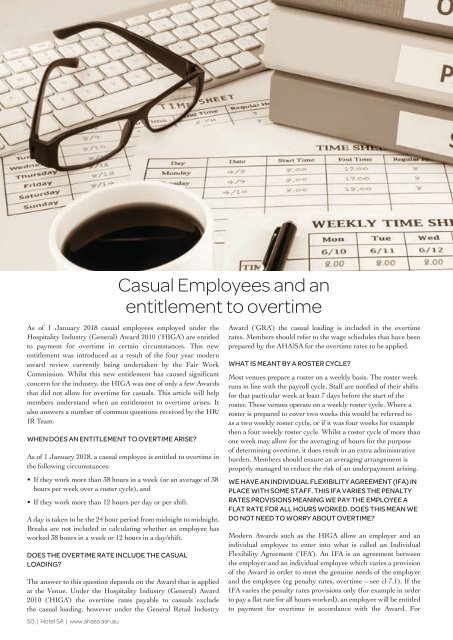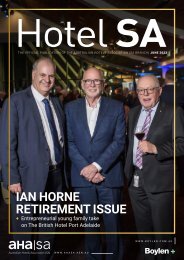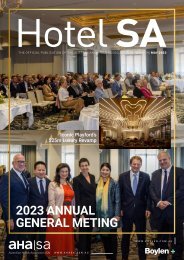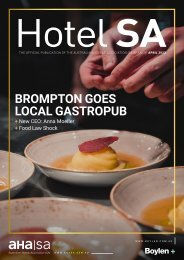HSA Feb_Mar 18_Web
Create successful ePaper yourself
Turn your PDF publications into a flip-book with our unique Google optimized e-Paper software.
As of 1 January 20<strong>18</strong> casual employees employed under the<br />
Hospitality Industry (General) Award 2010 (‘HIGA’) are entitled<br />
to payment for overtime in certain circumstances. This new<br />
entitlement was introduced as a result of the four year modern<br />
award review currently being undertaken by the Fair Work<br />
Commission. Whilst this new entitlement has caused significant<br />
concern for the industry, the HIGA was one of only a few Awards<br />
that did not allow for overtime for casuals. This article will help<br />
members understand when an entitlement to overtime arises. It<br />
also answers a number of common questions received by the HR/<br />
IR Team.<br />
WHEN DOES AN ENTITLEMENT TO OVERTIME ARISE?<br />
As of 1 January 20<strong>18</strong>, a casual employee is entitled to overtime in<br />
the following circumstances:<br />
• If they work more than 38 hours in a week (or an average of 38<br />
hours per week over a roster cycle), and<br />
• If they work more than 12 hours per day or per shift.<br />
A day is taken to be the 24 hour period from midnight to midnight.<br />
Breaks are not included in calculating whether an employee has<br />
worked 38 hours in a week or 12 hours in a day/shift.<br />
DOES THE OVERTIME RATE INCLUDE THE CASUAL<br />
LOADING?<br />
The answer to this question depends on the Award that is applied<br />
at the Venue. Under the Hospitality Industry (General) Award<br />
2010 (‘HIGA’) the overtime rates payable to casuals exclude<br />
the casual loading, however under the General Retail Industry<br />
50 | Hotel SA | www.ahasa.asn.au<br />
Casual Employees and an<br />
entitlement to overtime<br />
Award (‘GRA’) the casual loading is included in the overtime<br />
rates. Members should refer to the wage schedules that have been<br />
prepared by the AHA|SA for the overtime rates to be applied.<br />
WHAT IS MEANT BY A ROSTER CYCLE?<br />
Most venues prepare a roster on a weekly basis. The roster week<br />
runs in line with the payroll cycle. Staff are notified of their shifts<br />
for that particular week at least 7 days before the start of the<br />
roster. These venues operate on a weekly roster cycle. Where a<br />
roster is prepared to cover two weeks this would be referred to<br />
as a two weekly roster cycle, or if it was four weeks for example<br />
then a four weekly roster cycle. Whilst a roster cycle of more than<br />
one week may allow for the averaging of hours for the purpose<br />
of determining overtime, it does result in an extra administrative<br />
burden. Members should ensure an averaging arrangement is<br />
properly managed to reduce the risk of an underpayment arising.<br />
WE HAVE AN INDIVIDUAL FLEXIBILITY AGREEMENT (IFA) IN<br />
PLACE WITH SOME STAFF. THIS IFA VARIES THE PENALTY<br />
RATES PROVISIONS MEANING WE PAY THE EMPLOYEE A<br />
FLAT RATE FOR ALL HOURS WORKED. DOES THIS MEAN WE<br />
DO NOT NEED TO WORRY ABOUT OVERTIME?<br />
Modern Awards such as the HIGA allow an employer and an<br />
individual employee to enter into what is called an Individual<br />
Flexibility Agreement (‘IFA’). An IFA is an agreement between<br />
the employer and an individual employee which varies a provision<br />
of the Award in order to meet the genuine needs of the employer<br />
and the employee (eg penalty rates, overtime – see cl 7.1). If the<br />
IFA varies the penalty rates provisions only (for example in order<br />
to pay a flat rate for all hours worked), an employee will be entitled<br />
to payment for overtime in accordance with the Award. For


















